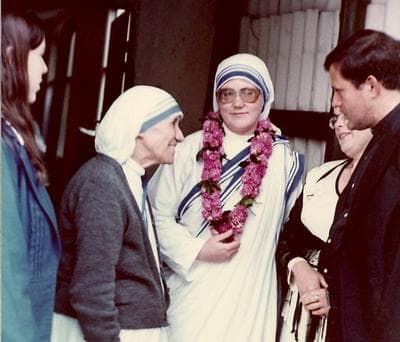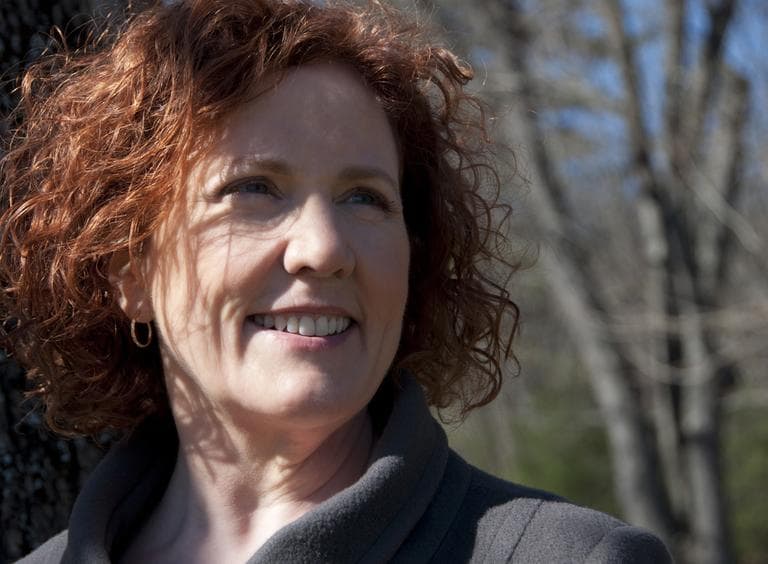Advertisement
'An Unquenchable Thirst': A Former Nun's Account Of Life In Mother Teresa's Order

Seventeen years old. It's a great time to fall in love and figure out what want to do with your life. That’s what happened to Mary Johnson, one day as she was walking past her high school library.

"In the window, there was a cover of Time magazine," Johnson remembers. "The eyes of this woman on the cover just drew me in. The bell was ringing for my French class and I didn't pay any attention. I just walked right into the library and took the magazine off the shelf and started reading about Mother Teresa. And as I read the article about how Mother Teresa was taking the poor off the streets of Calcutta, finding babies in dustbins, taking people who were dying and caring for them. Somehow I just knew--that's what I had to do."
Johnson did join Mother Teresa’s order. She spent 20 years as a sister in the Missionaries of Charity, but now lives in Nashua, New Hampshire after leaving the order.
She writes about it in her new book "An Unquenchable Thirst: Following Mother Teresa in Search of Love, Service, and an Authentic Life” and she joins us to talk about her experience.
Guest:
- Mary Johnson, author
Excerpt:
"An Unquenchable Thirst"
I had first met Mother on the cover of Time in 1975, an image that rendered Mother in watercolor under the headline “Living Saints.” When I’d spotted the magazine in my southeast Texas high school library,
I’d dropped into a chair to read it, skipping French class, drawn by the magnetic call of the nun’s soulful eyes. I read of the desperate needs of the poor dying on the streets, of babies abandoned in dustbins. The photo that impressed me most showed a young Indian nun peacefully bent over a man whose legs, nowhere thicker than a baseball bat, were bound in rags. The man’s ribs formed prominent ridges on his bare chest, while his eyes, sunk deep in their sockets, were riveted on the face of the nun cutting his nails.
I felt as if the world had suddenly opened itself and revealed my place in it. Since my preparation for First Communion, I’d known that loving others was life’s most important calling. That conviction had grown through the years as I’d experienced love’s power, and the pain of its lack, for myself. There in the library, with a seventeen-year-old’s clarity, I knew that I was meant to follow this nun in Calcutta who loved those most in need of it.
Advertisement
That week I wrote my first letter to her, addressing it simply Mother Teresa, Missionaries of Charity, Calcutta, India, begging her to take me as one of her own sisters. Eighteen months later, in a convent in the South Bronx, over my parents’ objections Mother pinned a crucifix to my blouse, saying, “Receive the symbol of your Crucified Spouse. Carry His light and His love into the homes of the poor everywhere you go.” I did just that for twenty years.
I tucked the latest issue of Time under my arm and climbed the agency’s front steps. I uttered no prayer. Through years of wrestling with my own dark nights, I’d replaced marriage to God with a different sort of integrity. I reached to ring the bell, ready to tell my secrets to the agent and to anyone else who would listen. I would have told them to Mother if I could. Mother Teresa would have called my secrets blasphemy, but I call them freedom. I even call them love.
Excerpted from AN UNQUENCHABLE THIRST: Following Mother Teresa in Search of Love, Service, and an Authentic Life by Mary Johnson Copyright © 2011 by Mary Johnson. Excerpted by permission of Random House Group, a division of Random House, Inc. All rights reserved. No part of this excerpt may be reproduced or reprinted without permission in writing from the publisher.
This segment aired on December 9, 2011.